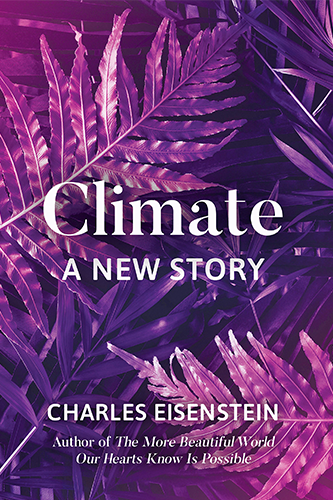Climate: A New Story

Can you imagine a world without climate change?
I don’t mean one where we’ve engineered our way through the problem, I mean one in which the problem hasn’t arisen to begin with. What collective values would be shared by humans in such a world? How would we relate to each other, to the creatures around us, to the land we live on? What would compel us not to harm the earth?
These are the questions that came up for me while reading Charles Eisenstein’s book, Climate: A New Story. I found it a challenging book, because it questioned a lot of my assumptions about why climate change is happening and what the solutions may be.
The conventional narrative is that climate change is caused because we are burning fossil fuels and putting lots of greenhouse gases into the atmosphere. We’re doing this because human society needs to consume vast amounts of energy in order to keep the show on the road. Therefore we need to figure out how we can satisfy that demand for energy through renewable sources.
This is a ‘geomechanical’ view of the problem. It hinges on a belief that humans can and do understand the complexity of ecological processes, and that we can measure and control them. Obviously that is true to some extent—we are able to measure things like CO2 concentrations in the atmosphere—but what is being left out?
Eisenstein argues that by reducing everything to emissions and carbon, we’re failing to see the earth has a living system with complex networks of interdependencies, and failing to value that which we cannot quantify.
For example: what is the value of a forest?
A carbon perspective would say: we can measure the carbon sequestration potential of the trees, and we can justify chopping them down if we can sequester the same amount of carbon elsewhere. (Perhaps by inventing a carbon-sucking machine through the boundless technical prowess of human ingenuity!)
A living systems perspective would say: this forest has inherent value, and maintains the conditions for life in ways which we will never fully understand. The trees and the understory protect the soil and the carbon stored within it from erosion and desertification. The forest as a whole acts as a big sponge, storing water when the rains come, preventing floods, and releasing it when they don’t, preventing droughts.
Eisenstein says that ‘life creates the conditions for life’ and earth’s ecosystems want to maintain the balance in our atmosphere and in the water cycle, but humans have been destroying those ecosystems for centuries. Until we recognise that we are a part of nature, and that our fate is bound up in the fate of the rest of life on earth, things will continue to get worse—regardless of whether or not we stop burning fossil fuels.
His point is that our destruction of life is driven by some deep conditions which have to change:
- Our system of money and economic growth, which relies on the continued creation of more and more debt, forces us to continue exploiting nature in order to pay back that debt
- The belief that we can understand the world by reduction to its component parts allows us to think that we can know the consequences of our actions, but is blind to the real complexity and interconnectedness of living systems
- The belief that we are all separate selves competing for survival in an indifferent world numbs our empathy from a young age and allows us to participate in harming each other and the earth
So work that aims to shift those conditions is also work that helps to restore the ecological balance, even if it is not directly obvious why. This is quite a different perspective to the view that “getting off fossil fuels is the most urgent issue—we can’t fix anything else if we’ve already fried the planet!”
This book has given me a lot to mull over. It contains an incisive critique of ‘war thinking’—the idea that to solve a problem we must identify the ‘bad guys’ and overcome them by force. In relation to climate change, I’m wondering if rather than figuring out how to shut down the fossil fuel industry, we could create a world in which the humans involved have no need or desire to continue extracting fossil fuels. And one where refugees are not a ‘problem’, because there aren’t any refugees. And nobody is hungry. That seems to me like a world where climate change isn’t happening.
If you’re interested to learn more:
Comments
I'd love to hear from you here instead of on corporate social media platforms! You can also contact me privately.
Add your comment